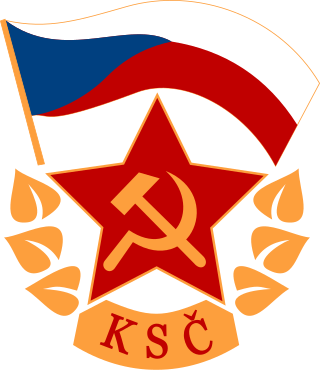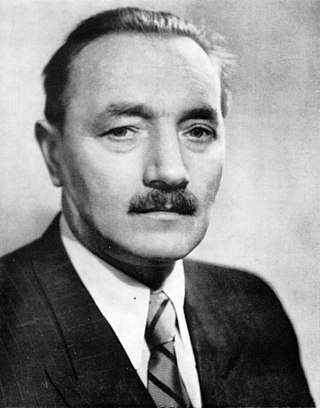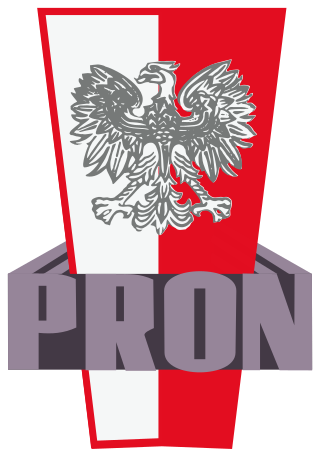Politics of Slovakia takes place in a framework of a parliamentary representative democratic republic, with a multi-party system. Legislative power is vested in the parliament and it can be exercised in some cases also by the government or directly by citizens.

The Polish United Workers' Party, commonly abbreviated to PZPR, was the communist party which ruled the Polish People's Republic as a one-party state from 1948 to 1989. The PZPR had led two other legally permitted subordinate minor parties together as the Front of National Unity and later Patriotic Movement for National Rebirth. Ideologically, it was based on the theories of Marxism-Leninism, with a strong emphasis on left-wing nationalism. The Polish United Workers' Party had total control over public institutions in the country as well as the Polish People's Army, the UB and SB security agencies, the Citizens' Militia (MO) police force and the media.

The Communist Party of Czechoslovakia was a communist and Marxist–Leninist political party in Czechoslovakia that existed between 1921 and 1992. It was a member of the Comintern. Between 1929 and 1953, it was led by Klement Gottwald. The KSČ was the sole governing party in the Czechoslovak Socialist Republic though it was a leading party along with the Slovak branch and four other legally permitted non-communist parties. After its election victory in 1946, it seized power in the 1948 Czechoslovak coup d'état and established a one-party state allied with the Soviet Union. Nationalization of virtually all private enterprises followed, and a command economy was implemented.

The National Front, also known as the National Front of Czechs and Slovaks was a political coalition created in 1943 serving as united front of political parties for liberation of Czechoslovakia, after 1948 organized solely by the Communist Party of Czechoslovakia. It was the vehicle for control of all political and social activity by the Communist Party of Czechoslovakia (KSČ).
With the collapse of the Austria-Hungary at the end of World War I, the independent country of Czechoslovakia was formed as a result of the critical intervention of U.S. President Woodrow Wilson, among others.
The National Front of the German Democratic Republic was officially an alliance of parties and mass organisations (1950–1990). In fact, only one party held power in the GDR, namely the communist SED. The National Front was an instrument to exercise control over the other parties and organisations. The precursor of the National Front was the Democratic Bloc.

Gustáv Husák was a Czechoslovak politician who served as the long-time First Secretary of the Communist Party of Czechoslovakia from 1969 to 1987 and the President of Czechoslovakia from 1975 to 1989.

Czech National Social Party is a civic nationalist political party in the Czech Republic, that once played an important role in Czechoslovakia during the interwar period. It was established in 1897 by break-away groups from both the national liberal Young Czech Party and the Czech Social Democratic Party, with a stress on achieving independence of the Czech lands from Austria-Hungary. Its variant of socialism was moderate and reformist rather than a Marxist one. After the National Labour Party dissolved and merged with National Socialists in 1930, the party also became the refuge for Czech liberals. Its best-known member was Edvard Beneš, a co-founder of Czechoslovakia and the country's second President during the 1930s and 1940s.
This article is intended to give an overview of liberalism in Slovakia.
The Social Democratic Party of Slovakia was a centre-left political party in Slovakia. Its last chairman, since 1993, was Jaroslav Volf, and its chairman in 1992 was Alexander Dubček.
The Democratic Party was a political party in Slovakia, active between 1989 and 2006.
The Slovak National Council was an organisation that was formed at various times in the 19th and 20th centuries to act as the highest representative of the Slovak nation. It originated in the mid-19th century as a focus for Slovak nationalist aspirations to break away from the Kingdom of Hungary but its bid for independence was suppressed. The second SNR was more successful, issuing a celebrated declaration of Slovak independence in 1918, though it too was ultimately dissolved by the state after Czechoslovakia was formed. The third SNR coordinated Slovak resistance to the Nazis and their Slovak puppet government, and evolved into a Communist-controlled organ of state power after the Second World War. Following the 1989 Velvet Revolution it was transformed into the new democratically elected Slovak parliament. A number of mostly short-lived and not particularly influential Slovak National Councils were also proclaimed abroad between the 1920s and 1940s, the last one seeking to mobilise Slovak émigré resistance to Communist rule.

Parliamentary elections were held in Poland on 26 October 1952. They were the first elections to the Sejm, the parliament of the Polish People's Republic. The official rules for the elections were outlined in the new Constitution of the Polish People's Republic and lesser acts.

The Communist Party of Slovakia was a communist party in Slovakia. It was formed in May 1939, when the Slovak Republic was created, as the Slovak branches of the Communist Party of Czechoslovakia (KSČ) were separated from the mother party. When Czechoslovakia was again established as a unified state, the KSS was still a separate party for a while (1945–1948). On 29 September 1948, it was reunited with the KSČ and continued to exist as an "organizational territorial unit of the KSČ on the territory of Slovakia". Its main organ was Pravda.

Patriotyczny Ruch Odrodzenia Narodowego was a Polish popular front that ruled the Polish People's Republic. It was created in the aftermath of the martial law in Poland (1982). Gathering various pro-communist and pro-government organizations, it was attempted to show unity and support for the government and the Polish United Workers' Party (PZPR). PRON was created in July 1982 and dissolved in November 1989.

Ján Ševčík was a Czechoslovak politician.

The Democratic Party was a conservative political party in Slovakia, existing during the final phase of World War II and the Third Czechoslovak Republic, from 1944 to 1948.
This page is based on this
Wikipedia article Text is available under the
CC BY-SA 4.0 license; additional terms may apply.
Images, videos and audio are available under their respective licenses.








